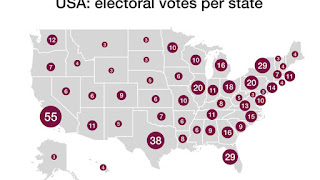Why the Founders Rejected Direct Election of the President
“The mode of appointment of the Chief Magistrate... should be as little connected with any plan of choosing Senators or Representatives as possible.”
— Alexander Hamilton, Federalist No. 68
Few constitutional mechanisms provoke as much confusion—or outrage—as the Electoral College. Every four years, Americans debate whether it’s outdated, unfair, or undemocratic. Critics point to elections where a candidate won the presidency without winning the popular vote and ask, “How can this be just?”
It’s a fair question—but one rooted in a modern misunderstanding of the Founders’ design. The Electoral College isn’t a relic of compromise. It’s a feature of the federal system—a deliberate safeguard against both mob rule and centralized tyranny.
If you want to understand why the presidency works the way it does, you have to understand why the Electoral College was created—and why its critics often miss the point.
What Is the Electoral College?
The Electoral College is not a place. It’s a process.
Each state is assigned a number of electors equal to its number of U.S. Senators (always 2) plus its Representatives (which varies based on population).
When citizens vote for president, they’re actually voting for a slate of electors pledged to that candidate.
Those electors then cast the official votes for president and vice president.
It takes 270 electoral votes to win the presidency. Most states use a winner-take-all system, awarding all their electoral votes to the candidate who wins the statewide popular vote.
Why Didn’t the Founders Choose a Popular Vote?
Because they didn’t trust majorities—or centralized power.
The Founders feared that:
Direct national elections would give outsized influence to large population centers
Presidents would become demagogues, appealing to emotion instead of reason
Small states and rural citizens would be ignored entirely
And that a pure popular vote would encourage national campaigning and national corruption
Instead, they wanted:
A system that respected state sovereignty
A balance between population and federalism
A process that could act as a final “filter” against a dangerous or unfit candidate (via electors)
The Electoral College was the compromise between pure democracy and aristocratic selection. It embodied the republic: government by representation, restrained by structure.
What the Electoral College Actually Does
✅ Preserves federalism – States matter. Their voice in choosing the president reflects their independent role in the constitutional system.
✅ Prevents regional dominance – A candidate must build a broad coalition of support across diverse states, not just win a few populous urban centers.
✅ Encourages political balance – Campaigns must appeal to swing states and coalitions, not just base voters.
✅ Creates clear outcomes – The Electoral College almost always produces a decisive winner, avoiding national runoff elections or contested results in razor-thin popular votes.
The Most Common Criticisms (and Why They Miss the Mark)
“It’s undemocratic!”
Correct—it’s not meant to be purely democratic. It’s constitutionally republican.
The Constitution was never designed for mob rule. It was designed for deliberative liberty.
“The popular vote winner should win the presidency!”
Not necessarily. The president is not meant to represent individuals directly. He represents the union of states. That’s why the office was designed differently from Congress.
“It gives too much power to small states!”
In part—yes. But that’s intentional. So does the Senate. This protects small and rural states from being steamrolled by large metro areas.
In a union, every part must have a voice. The Electoral College forces presidential candidates to earn national—not just numerical—support.
What Happens If It’s Abolished?
Abolishing the Electoral College would:
Shift all presidential power to urban centers
Erase federalism in presidential elections
Invite regional politics and populist appeals
Encourage national vote fraud and recount chaos
Undermine the balance that makes the union stable
The alternative is not fairness. It’s centralization. And history shows us that centralized, majoritarian systems rarely protect minority rights or individual liberty.
Why It Still Matters
The Electoral College protects against political fads, regional domination, and unfiltered populism. It reinforces the idea that we are a republic of states, not just a mass of voters.
If it’s misunderstood today, it’s because we’ve drifted from the constitutional principles that made the system necessary in the first place.
Understanding the Electoral College helps citizens:
Appreciate the structure of our union
Recognize the value of state-level engagement
Defend the system not because it’s perfect, but because it’s principled
Next: Why State and Local Government Matters More Than You Think
In the next post, we’ll leave the federal stage for a moment and talk about the levels of government that actually affect your daily life the most. Spoiler: it’s not Congress. It’s your city hall, your state legislature, and your local school board.

Comments
Post a Comment
I welcome respectful, thoughtful feedback—especially from those who care about education, history, and the values that shape our society. Whether you’re an educator, student, parent, or curious reader, feel free to leave a comment or question below. Let’s keep the conversation sharp, civil, and grounded in truth.